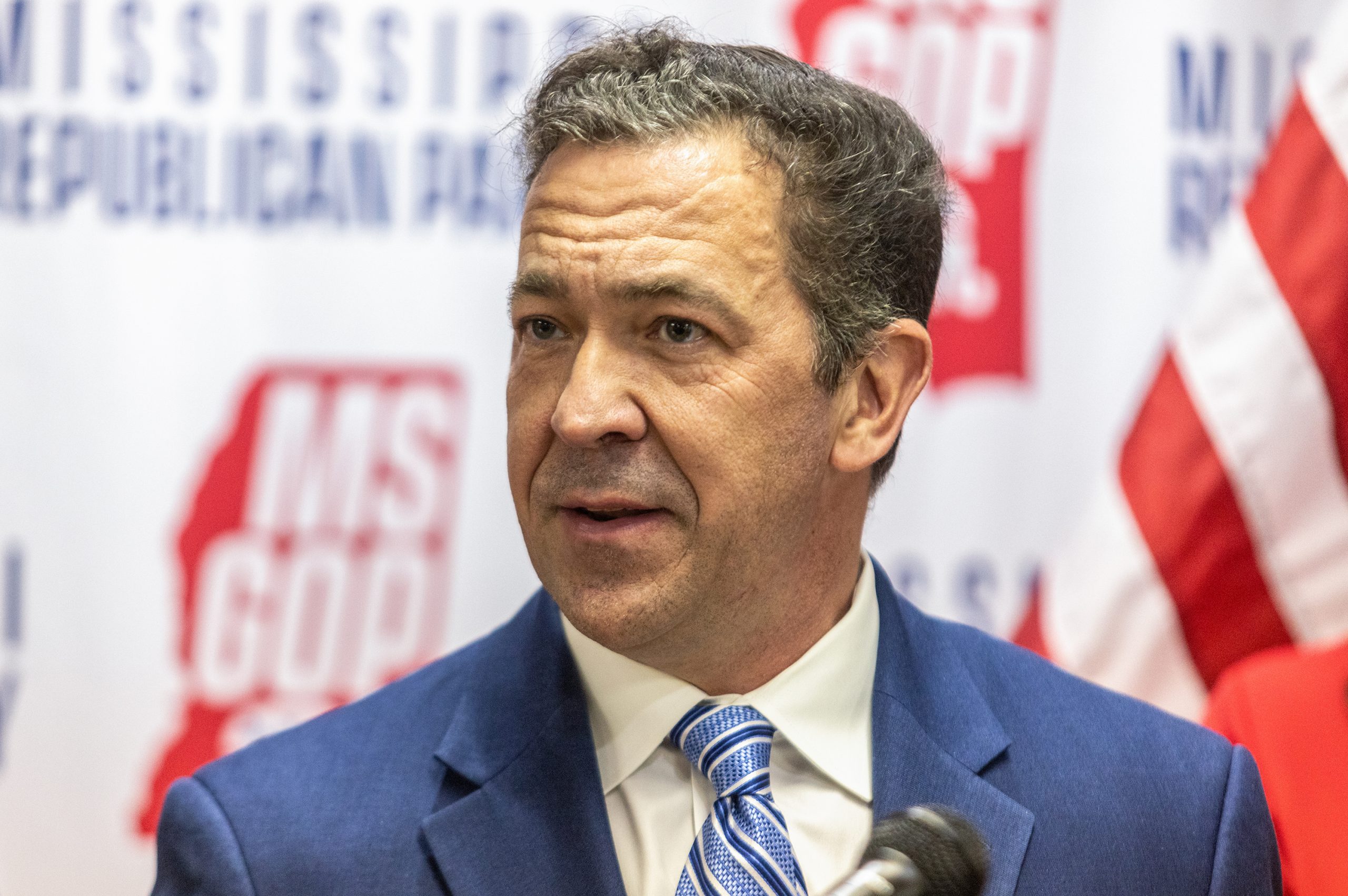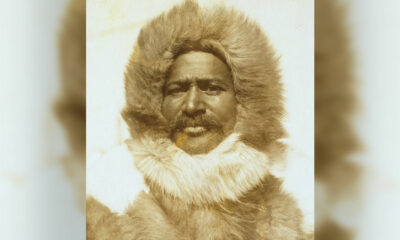Mississippi Today
McDaniel vows to sideline Democratic senators if elected lieutenant governor

In his effort to label incumbent Republican Lt. Gov. Delbert Hosemann “Delbert the Democrat,” challenger Chris McDaniel says Hosemann gives Senate Democrats too much power as committee chairmen.
But Hosemann counters that he’s appointed more Republicans to chairmanships than any first-term lieutenant governor and that he routes important legislation to GOP-run committees.
McDaniel, if elected, vows to break with Republican lieutenant governor predecessors Hosemann, Gov. Tate Reeves, former Gov. Phil Bryant and Amy Tuck and appoint only Republicans to Senate chairmanships.
“As lieutenant governor, I will empower my Republican colleagues and appoint Republican senators to all chairmanships,” McDaniel said in a statement.
But McDaniel faces at least one challenge in that: math.
The Senate has 41 standing and joint committees.
The Mississippi Senate has 52 members. There are 36 Republicans and 16 Democrats, a number not expected to drastically change with this year’s election.
Further complicating things, of the 36 current Republicans, there are 11 freshmen. While there are occasional exceptions, unless they come in with specific expertise, freshmen are not usually appointed to major chairmanships until they’ve served at least a term because they haven’t learned the ropes of legislating and how to run committees.
Under McDaniel’s vow, it would appear some Republican senators would chair multiple committees. Unlike the House, there is no Senate rule against one member chairing multiple standing committees, but it would create a heavy workload for someone doing so, and concentrate much power into a smaller, less diverse group.
Under the current Senate makeup, this would also mean McDaniel would appoint no Black senators to chairmanships, despite Mississippi having the highest percentage Black population in the nation, 38%. An all-white Senate leadership team would hearken back to Mississippi’s Jim Crow past style of governance.
Hosemann has appointed 13 of the 16 current Democratic senators to chairmanships. This is the same number of Democratic chairmen now-Gov. Reeves had in his final term leading the Senate as lieutenant governor. In Reeves’ first term as lieutenant governor, he appointed 17 Democrats as committee chairs.
But McDaniel has not accused Reeves, who he endorsed for governor, of closeted Democratic leanings, instead recently saying, “Tate is a conservative.”
Reeves’ predecessor, Republican Gov. Bryant, ran a Senate that still had a slim Democratic majority and fewer committees. In his term as lieutenant governor, Bryant had 17 Republican committee chairs and 19 Democrats.
In his statement, McDaniel said: “Lieutenant Governor Delbert ‘the Democrat’ Hosemann used his office to further his liberal agenda and undermine Republican lawmakers by appointing Democrats to chair powerful committees. His appointment of Democrats to these pivotal positions undermines the will of Mississippi voters — who elected supermajorities in both chambers for a reason.”
McDaniel points to Sen. Hob Bryan, D-Amory, serving as Public Health Committee chairman — a relatively powerful position in the Legislature — and said Hosemann “appointed one of Mississippi’s most liberal leaders to its powerful post.”
But Bryan has served nearly 40 years in the Senate, and held the Public Health chairmanship under Bryant. Under Reeves for two terms, Bryan held the also-powerful post of Judiciary B Committee chairman.
McDaniel, whom Hosemann appointed chair of the Environmental Protection, Conservation and Water Resources Committee, said: “The Democratic Party is so radicalized today, they do not reflect the values of Mississippi, and certainly do not deserve appointment to position of power to wield their socialist agendas.”
Hosemann in a statement said: “I have appointed more Republicans to chair committees during this term than the first term of any lieutenant governor. Additionally, every major piece of legislation has gone through Republican chairmen — from a $525 million tax cut to our election security package to increasing penalties for violent crime to the largest teacher pay raise in the state’s history.
“My opponent simply is not being honest about the Senate’s conservative achievements and the facts.”
This article first appeared on Mississippi Today and is republished here under a Creative Commons license.
Mississippi Today
On this day in 1909, Matthew Henson reached the North Pole
April 6, 1909

Matthew Henson reached the North Pole, planting the American flag. Traveling with the Admiral Peary Expedition, Henson reportedly reached the North Pole almost 45 minutes before Peary and the rest of the men.
“As I stood there on top of the world and I thought of the hundreds of men who had lost their lives in the effort to reach it, I felt profoundly grateful that I had the honor of representing my race,” he said.
While some would later dispute whether the expedition had actually reached the North Pole, Henson’s journey seems no less amazing.
Born in Maryland to sharecropping parents who survived attacks by the KKK, he grew up working, becoming a cabin boy and sailing around the world.
After returning, he became a salesman at a clothing store in Washington, D.C., where he waited on a customer named Robert Peary. Pearywas so impressed with Henson and his tales of the sea that he hired him as his personal valet.
Henson joined Peary on a trip to Nicaragua. Impressed with Henson’s seamanship, Peary made Henson his “first man” on the expeditions that followed to the Arctic. When the expedition returned, Peary drew praise from the world while Henson’s contributions were ignored.
Over time, his work came to be recognized. In 1937, he became the first African-American life member of The Explorers Club. Seven years later, he received the Peary Polar Expedition Medal and was received at the White House by President Truman and later President Eisenhower.
“There can be no vision to the (person) the horizon of whose vision is limited by the bounds of self,” he said. “But the great things of the world, the great accomplishments of the world, have been achieved by (people with) … high ideals and … great visions. The path is not easy, the climb is rugged and hard, but the glory at the end is worthwhile.”
Henson died in 1955, and his body was re-interred with full military honors at Arlington National Cemetery. The U.S. Postal Service featured him on a stamp, and the U.S. Navy named a Pathfinder class ship after him. In 2000, the National Geographic Society awarded him the Hubbard Medal.
This article first appeared on Mississippi Today and is republished here under a Creative Commons Attribution-NoDerivatives 4.0 International License.![]()
Mississippi Today
A win for press freedom: Judge dismisses Gov. Phil Bryant’s lawsuit against Mississippi Today
Madison County Circuit Court Judge Bradley Mills dismissed former Gov. Phil Bryant’s defamation lawsuit against Mississippi Today on Friday, ending a nearly two-year case that became a beacon in the fight for American press freedom.
For the past 22 months, we’ve vigorously defended our Pulitzer Prize-winning reporting and our characterizations of Bryant’s role in the Mississippi welfare scandal. We are grateful today that the court, after careful deliberation, dismissed the case.
The reporting speaks for itself. The truth speaks for itself.
This judgment is so much more than vindication for Mississippi Today — it’s a monumental victory for every single Mississippian. Journalism is a public good that all of us deserve and need. Too seldom does our state’s power structure offer taxpayers true government accountability, and Mississippians routinely learn about the actions of their public officials only because of journalism like ours. This reality is precisely why we launched our newsroom nine years ago, and it’s why we devoted so much energy and spent hundreds of thousands of dollars defending ourselves against this lawsuit. It was an existential threat to our organization that took time and resources away from our primary responsibilities — which is often the goal of these kinds of legal actions. But our fight was never just about us; it was about preserving the public’s sacred, constitutional right to critical information that journalists provide, just as our nation’s Founding Fathers intended.
Mississippi Today remains as committed as ever to deep investigative journalism and working to provide government accountability. We will never be afraid to reveal the actions of powerful leaders, even in the face of intimidation or the threat of litigation. And we will always stand up for Mississippians who deserve to know the truth, and our journalists will continue working to catalyze justice for people in this state who are otherwise cheated, overlooked, or ignored.
We appreciate your support, and we are honored to serve you with the high quality, public service journalism you’ve come to expect from Mississippi Today.
READ MORE: Judge Bradley Mills’ order dismissing the case
READ MORE: Mississippi Today’s brief in support of motion to dismiss
This article first appeared on Mississippi Today and is republished here under a Creative Commons Attribution-NoDerivatives 4.0 International License.
Mississippi Today
Meet Willye B. White: A Mississippian we should all celebrate
In an interview years and years ago, the late Willye B. White told me in her warm, soothing Delta voice, “A dream without a plan is just a wish. As a young girl, I had a plan.”
She most definitely did have a plan. And she executed said plan, as we shall see.
And I know what many readers are thinking: “Who the heck was Willye B. White?” That, or: “Willye B. White, where have I heard that name before?”
Well, you might have driven an eight-mile, flat-as-a-pancake stretch of U.S. 49E, between Sidon and Greenwood, and seen the marker that says: “Willye B. White Memorial Highway.” Or you might have visited the Olympic Room at the Mississippi Sports Hall of Fame and seen where White was a five-time participant and two-time medalist in the Summer Olympics as a jumper and a sprinter.
If you don’t know who Willye B. White was, you should. Every Mississippian should. So pour yourself a cup of coffee or a glass of iced tea, follow along and prepare to be inspired.
Willye B. White was born on the last day of 1939 in Money, near Greenwood, and was raised by grandparents. As a child, she picked cotton to help feed her family. When she wasn’t picking cotton, she was running, really fast, and jumping, really high and really long distances.
She began competing in high school track and field meets at the age of 10. At age 11, she scored enough points in a high school meet to win the competition all by herself. At age 16, in 1956, she competed in the Summer Olympics at Melbourne, Australia.
Her plan then was simple. The Olympics, on the other side of the world, would take place in November. “I didn’t know much about the Olympics, but I knew that if I made the team and I went to the Olympics, I wouldn’t have to pick cotton that year. I was all for that.”
Just imagine. You are 16 years old, a high school sophomore, a poor Black girl. You are from Money, Mississippi, and you walk into the stadium at the Melbourne Cricket Grounds to compete before a crowd of more than 100,000 strangers nearly 10,000 miles from your home.
She competed in the long jump. She won the silver medal to become the first-ever American to win a medal in that event. And then she came home to segregated Mississippi, to little or no fanfare. This was the year after Emmett Till, a year younger than White, was brutally murdered just a short distance from where she lived.
“I used to sit in those cotton fields and watch the trains go by,” she once told an interviewer. “I knew they were going to some place different, some place into the hills and out of those cotton fields.”
Her grandfather had fought in France in World War I. “He told me about all the places he saw,” White said. “I always wanted to travel and see the places he talked about.”
Travel, she did. In the late 1950s there were two colleges that offered scholarships to young, Black female track and field athletes. One was Tuskegee in Alabama, the other was Tennessee State in Nashville. White chose Tennessee State, she said, “because it was the farthest away from those cotton fields.”
She was getting started on a track and field career that would take her, by her own count, to 150 different countries across the globe. She was the best female long jumper in the U.S. for two decades. She competed in Olympics in Melbourne, Rome, Tokyo, Mexico City and Munich. She would compete on more than 30 U.S. teams in international events. In 1999, Sports Illustrated named her one of the top 100 female athletes of the 20th century.
Chicago became White’s home for most of adulthood. This was long before Olympic athletes were rich, making millions in endorsements and appearance fees. She needed a job, so she became a nurse. Later on, she became an public health administrator as well as a coach. She created the Willye B. White Foundation to help needy children with health and after school care.
In 1982, at age 42, she returned to Mississippi to be inducted into the Mississippi Sports Hall of Fame and was welcomed back to a reception at the Governor’s Mansion by Gov. William Winter, who introduced her during induction ceremonies. Twenty-six years after she won the silver medal at Melbourne, she called being hosted and celebrated by the governor of her home state “the zenith of her career.”
Willye B. White died of pancreatic cancer in a Chicago hospital in 2007. While working on an obituary/column about her, I talked to the late, great Ralph Boston, the three-time Olympic long jump medalist from Laurel. They were Tennessee State and U.S. Olympic teammates. They shared a healthy respect from one another, and Boston clearly enjoyed talking about White.
At one point, Ralph asked me, “Did you know Willye B. had an even more famous high school classmate.”
No, I said, I did not.
“Ever heard of Morgan Freeman?” Ralph said, laughing.
Of course.
“I was with Morgan one time and I asked him if he ever ran track,” Ralph said, already chuckling about what would come next.
“Morgan said he did not run track in high school because he knew if he ran, he’d have to run against Willye B. White, and Morgan said he didn’t want to lose to a girl.”
This article first appeared on Mississippi Today and is republished here under a Creative Commons Attribution-NoDerivatives 4.0 International License.![]()
-

 Mississippi Today5 days ago
Mississippi Today5 days agoPharmacy benefit manager reform likely dead
-

 News from the South - Kentucky News Feed6 days ago
News from the South - Kentucky News Feed6 days agoTornado practically rips Bullitt County barn in half with man, several animals inside
-

 News from the South - Alabama News Feed6 days ago
News from the South - Alabama News Feed6 days ago'I think everybody's concerned': Mercedes-Benz plant eyeing impact of imported vehicle tariffs
-

 News from the South - Florida News Feed5 days ago
News from the South - Florida News Feed5 days agoFlorida special election results: GOP keeps 2 U.S. House seats in Florida
-

 News from the South - South Carolina News Feed3 days ago
News from the South - South Carolina News Feed3 days agoSouth Carolina clinic loses funding due to federal changes to DEI mandates
-

 News from the South - Alabama News Feed7 days ago
News from the South - Alabama News Feed7 days ago41st annual Bloomin Festival Arts and Crafts Fair (April 5 & 6) | March 31, 2025 | News 19 at 9 a.m.
-

 Mississippi Today5 days ago
Mississippi Today5 days agoRole reversal: Horhn celebrates commanding primary while his expected runoff challenger Mayor Lumumba’s party sours
-

 News from the South - Louisiana News Feed5 days ago
News from the South - Louisiana News Feed5 days agoMother turns son's tragedy into mental health mission















































